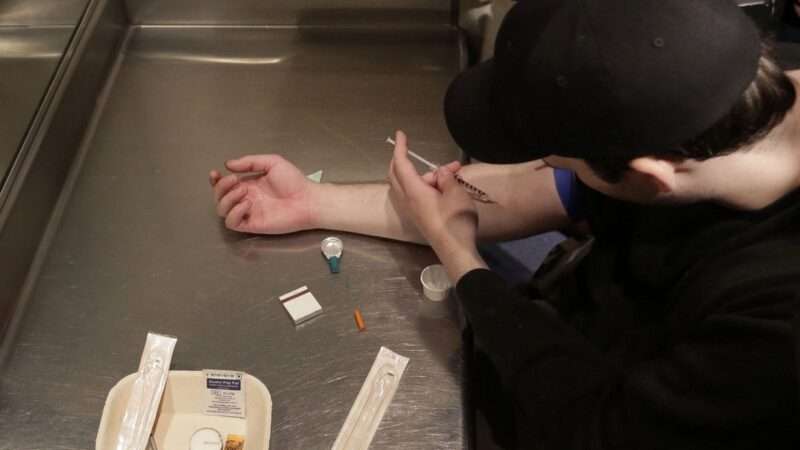
Aiming to prevent overdose deaths, California lawmakers have again given approval for its major cities to experiment with supervised injection facilities that would provide users a place to inject drugs under the supervision of health workers.
California's state Senate passed S.B. 57 on Monday, joining the Assembly (which passed it in June) in allowing San Francisco, Los Angeles, and Oakland to approve organizations to operate these injection sites, following a lengthy approval process that includes public meetings.
Lawmakers attempted to launch these injection facilities in San Francisco back in 2018, but then-Gov. Jerry Brown vetoed the bill, partly because he worried that he couldn't protect operators from federal prosecution (which everybody involved already knew was a risk) but really because his nanny state–style approach to addiction was to use government force to mandate people into drug treatment.
Since then, amid the COVID-19 epidemic, we've seen a dramatic, record-setting increase in drug overdose deaths. This increase and the open use of drugs in cities like San Francisco and Seattle have prompted a revival of the attitude that we can prosecute our way out of a crisis, even though we have decades of history showing that this just isn't true.
Safe injection sites aren't intended to be some sort of magic solution to a chronic drug addiction crisis; they are intended to reduce the likelihood of users dying. The sites provide safe needles and oversight for users while connecting people who want to get help to necessary services. There are more than 100 of these sites in other countries that haven't had any overdose deaths within their facilities. Studies show they don't appear to increase crime or drug use in the nearby area. But whether they have a larger impact on reducing overall overdose deaths is still unclear.
S.B. 57 accounts for this current thinness of research by requiring that jurisdictions that approve supervised injection sites choose an independent organization to conduct a peer-reviewed study to analyze both the effectiveness of the facilities and the impact on the nearby communities. Studies will be funded with private donations, grants, and local funds. The bill does not appropriate any state money to fund the potential sites.
The bill has the support of many drug policy organizations, civil liberties groups, public health organizations, and government bodies in both Los Angeles and San Francisco. The Drug Policy Alliance, which helped sponsor the bill, is urging Gov. Gavin Newsom to sign the bill into law.
"By passing SB 57 and embracing this cost-effective evidence-based public health intervention, the Legislature is making it abundantly clear that saving lives is its top priority," said Jeannette Zanipatin, California state director of the Drug Policy Alliance, in a prepared statement. "With countless lives hanging in the balance, we urge Governor Newsom to sign the bill without delay, so that we can adequately confront this crisis through the implementation of Overdose Prevention Programs and begin providing people the support they need."
New York City opened the country's first official supervised injection site in 2021, and last year, Rhode Island became the first state to legalize them with a two-year pilot program. Attempts to open sites prior to 2021 in places like Philadelphia have hit snags as some resistant U.S. attorneys have used a section of the federal Controlled Substances Act to argue that these sites are illegal under a 1986 law designed to shut down "crack houses."
But the Department of Justice under President Joe Biden (who supported such laws as a senator) may be close to reversing its position and supporting these operations. The White House's 2022 National Drug Control Strategy encourages the use of harm-reduction tools like naloxone (which reverses the effects of opioid overdoses) but stops short of recommending injection facilities. There is a heavy emphasis on getting people treatment and the typical, doomed efforts to disrupt drug trafficking.
"The Department is evaluating supervised consumption sites, including discussions with state and local regulators about appropriate guardrails for such sites, as part of an overall approach to harm reduction and public safety," a Justice Department spokeswoman said in a statement to The New York Times in July.
Newsom has said he is "open" to the idea of these injection sites but stopped short of fully endorsing them. It's not clear whether he's going to sign S.B. 57 into law, but advocates are hopeful.
The post California Lawmakers Approve Drug Injection Sites for Los Angeles, Oakland, San Francisco appeared first on Reason.com.







